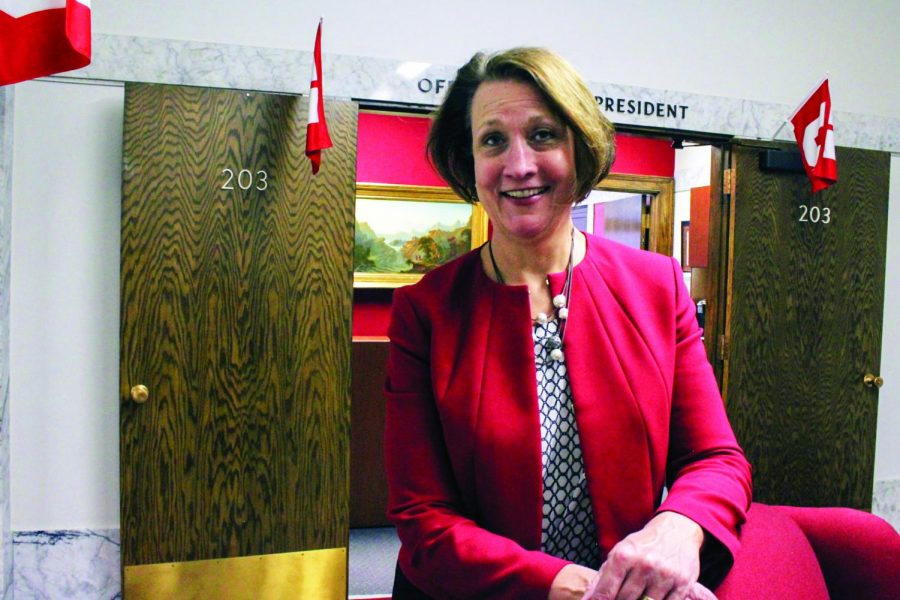Poma & Soter: Who Will Fill the Shoes of Ruth Watkins?
August 5, 2021
President Ruth Watkins left the University of Utah in April 2021. Her resignation, while unsurprising, still was a shock to the campus community. While Watkins did positive things during her presidency, she will always be remembered as the president who failed to properly handle the Lauren McCluskey case. As a result, the search for her replacement carries a lot of weight.
On Aug. 4, a forum took place to introduce three final candidates for the presidency. All the finalists have many accolades, but the discussions that took place made it abundantly clear what the U student body needs from its next president: someone that deeply cares about our institution. And that someone, after a nationwide search, was right here on campus all along.
Dr. Jayathi Murthy and Dr. Carrie Byington both demonstrated a deep passion for their respective fields of study, but not for the U as a whole. Dr. Murthy, as the Dean of UCLA’s School of Engineering, showed us a great understanding of her field and what she does at UCLA. But she also continuously compared the U to UCLA and its school of engineering. She didn’t have clear focus. She often referred to issues as being front and center, such as the growth of the U and climate change. And however honorable her intentions may be, a president simply can’t have everything be “the main focus.”
Similarly, Dr. Byington, as the VP for the University of California’s health enterprise, is obviously a well-educated doctor with a great passion for the healthcare system. Of the three candidates, Byington had the most concrete examples of how to properly handle COVID-19 in the coming school year. Byington’s potential initiatives to seriously tackle the disease provided solace considering the nationwide case count spikes. But it remained apparent that Byington was passionate about medicine, not the University of Utah, despite being a tenured professor at the U’s School of Medicine.
Overall, these two candidates as intellectual women of color displayed their individual strengths. But when it came down to systemic questions that they would face as president of the U, they fell short. When asked about how the U could gain more donors, Murthy essentially said that an “easy sell” is the story of a marginalized person with a low socioeconomic status going to a good university and succeeding. This statement disappointed us as children of immigrants.
And Byington also revealed shortcomings. When asked what she thought were the biggest challenges facing the humanities and arts, the question clearly caught her off guard. She said that online school was the toughest challenge those studies faced. But as students that lived through a pandemic, we can probably all agree that online school has challenged all of us — regardless of our major.
Based on these responses, finding a good successor to the presidency seemed impossible. But Dr. Taylor Randall surprised us with his genuine appreciation for the University of Utah and all that it is, unlike the other two candidates. The U, while a leading research institution, focuses on STEM, the arts and everything in between to become a school worth attending.
For instance, Yale, while also a research institution, has a prestigious drama program. And even though a president may not have expertise in every department within the university, they should acknowledge those gaps and find ways to bridge them.
In the short span of 45 minutes, Randall convinced us he would do just that. Not only did he present his knowledge about his role as Dean of the Eccles School of Business in a humble and genuine way, but he also made it apparent that his love for the U goes beyond one department.
Randall demonstrated a desire to listen and connect with the campus community and beyond. When asked about outreach to donors and to marginalized groups in Salt Lake City, he always brought the discussion back to listening to the people being affected. His democratic approach was relieving to hear after listening to Murthy’s shocking praise of Stalin’s leadership style.
Randall’s relationship with the U is a generational one, as both his father and grandfather were professors here before him. Furthermore, Randall received his undergraduate degree from the U and embarked on his career at the U shortly after graduating from the Wharton School of Business.
All this to say, Randall’s roots with the university are long-lasting and only further prove why his candidacy would be one of authentic passion and commitment.
If all goes as planned, the Utah Board of Higher Education will reveal the presidential winner at 5 p.m. on Aug. 5, 2021.









